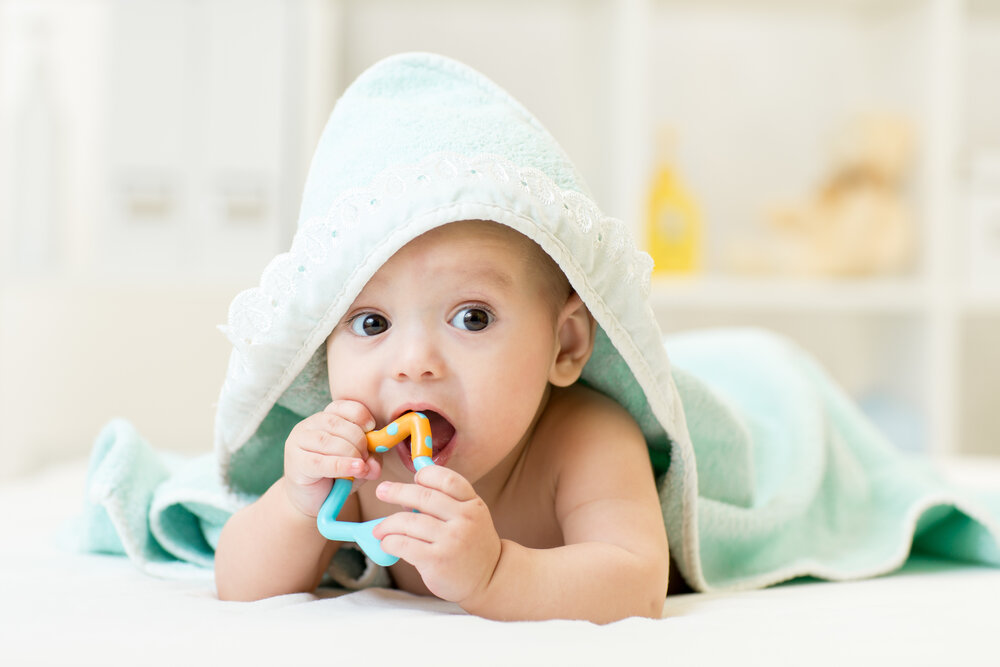How to know if your baby is teething or has an infection (teething symptoms)

Teething can be so tough for many babies and their parents. When my son is teething, I often wonder why it has to be so painful for them considering just being a baby can be hard enough!
As a parent and a physician, there are a few initial things parents should know about teething in addition to knowing when babies start teething and the remedies. First, it’s important to knowing the symptoms. Then you can make sure it’s teething rather than an infection.
When do babies start teething and what are the symptoms?
The age and sequence of teething varies greatly between children. Typically, the process starts around five to six months and most kids have all 20 primary teeth by the age of three. Heredity does play a bit of role so it might be worth pulling out your own baby book to see when you or your partner got your first tooth.
How do you know if your baby is teething?
Some of the telltale signs of teething include:
-
biting or gnawing on things (like their hand or your shoulder)
-
copious drool
-
irritability
-
swollen gums
-
decreased appetite
-
facial rash
-
requiring more cuddles, and
-
a change in bowels – “drool stool”.
Some of these signs can lead to secondary symptoms such as mild fever (<38.3C or 101F), earache, cough, diarrhea, and nasal congestion.
If you notice a drool rash, apply a soothing gentle moisturizer or even coconut oil to help protect the skin.
Infections in babies (viral infections in babies & bacterial infections in babies)
It is important to not just assume that your baby is teething with these symptoms. This is because they could also be fighting an infection. It can be hard to distinguish between teething and a possible infection (viral or bacterial infection). For this reason, it’s always good to check with your healthcare provider.
The list below shows some examples of each and why it can be hard to differentiate.
Signs of possible infection
-
Mucus typically thicker and coloured
-
Irritable
-
Mild – high fever
-
Rash
-
Pulling on ear
-
Diarrhea
-
Cough
-
Typically progresses
Signs your baby is teething
-
Saliva and mucus is clear
-
Irritable
-
Mild fever (<38.3C, 101F)
-
Rash
-
Pulling on ear
-
Diarrhea
-
Cough
-
Typically does not progress
Growing teeth is an important and exciting milestone but can come with some challenges for both babies and their parents, including sleepless nights!
See my post linked here on the best remedies for teething, starting with natural teething remedies, including the difference between tylenol or ibuprofen for teething.
How to tell if baby has an ear infection
Ear infections in babies and children are a common complaint many experience, especially between the ages of 6-36 months. Some children will grow out of frequent infections as they develop and their ear anatomy changes.
Find out more about ear infections, including prevention and natural remedies, and more about baby health, here.
Sleep is so important but the optimal amount is different for each family member.
It depends on age and other factors.
Find out the healthy sleep ranges by age, for you and your growing family.
Starting with babies (newborn to one year),
toddlers, preschoolers, school aged
children, teens and adults.
Guide to optimal family sleep (daytime naps & at night)
FREE download
Be the first to know about special
offers and resources
for our community only.
Don't miss out!
Become a Calm Parent Insider
FREE gifts & resources
CALMMOTHER LIMITED © 2023 | ALL RIGHTS RESERVED
terms | privacy | contact
Simplifying life for parents so you can focus on what matters most to you.
Live your best life with kids!
+ Show / Hide Comments
Share to: